AMD Radeon HD 7950 Review Feat. Sapphire & XFX: Sewing Up The High-End Market
by Ryan Smith on January 31, 2012 9:02 AM ESTOverclocking: Power, Temp, & Noise
In their marketing materials AMD is heavily pushing overclocking, and they have good reason to. With the 7970 we’ve established that Tahiti has quite a bit of overclocking headroom, and as the 7950 is clocked lower by default this opens up that headroom even further. Realistically AMD’s binning process means that the best clocking Tahiti GPUs are going to be allocated to the 7970 unless they have failed shaders, but even with that there’s quite a bit of potential on paper.
As with overclocking the 7970, our goal overclocking the 7950 is to see how much you can get for free; that is without any voltage adjustments. AMD’s reference PCBs are not particularly overbuilt for overclocking—cards like that will come later—so sticking to the reference voltage is the safest option, not to mention the easiest. With the 7970 we were able to get 200MHz (22%) overclocks without any voltage adjustment, and we’re hoping for the same out of the 7950.
With that said, we quickly ran into a wall on one card: the Sapphire 7950. Sapphire’s low VID of 0.993v may be great for temperature and noise at stock, but it’s not doing overclocking any favors. We only hit 950MHz at that voltage. As the Sapphire was the odd man out—every other card was at 1.093v—we did end up overvolting the Sapphire to 1.093v to see what it was capable of when put on similar footing as the rest of our cards.
After bringing up the voltage of our Sapphire card, all of our 7950s ended up overclocking to very similar levels. Our Sapphire and AMD cards topped out at 1025MHz core, a 225MHz (28%) overclock over a stock 7950 and a 125MHz (14%) overclock over the Sapphire’s factory overclock, while our XFX card reached 1050MHz, a 150MHz (17%) overclock beyond XFX’s factory overclock. Meanwhile the memory clocks on all of our cards topped out at 5.8GHz, beyond which we’d start seeing performance regressions from error correction on the memory bus.
| Radeon HD 7950 Overclocking | |||||
| AMD Radeon HD 7950 | Sapphire HD 7950 Overclock Edition | XFX R7950 BEDD | |||
| Shipping Core Clock | 800MHz | 900MHz | 900MHz | ||
| Shipping Memory Clock | 5GHz | 5GHz | 5.5GHz | ||
| Shipping Voltage | 1.093v | 0.993v | 1.093v | ||
| Overclock Core Clock | 1025MHz | 1025MHz | 1050MHz | ||
| Overclock Memory Clock | 5.8GHz | 5.8GHz | 5.8GHz | ||
| Overclock Voltage | 1.093v | 1.093v | 1.093v | ||
As you can imagine, with such similar overclocks, gaming performance on all 4 cards ended up being very similar. So we’ll get to gaming performance in a minute, while we’ll start with power, temperature, & noise.
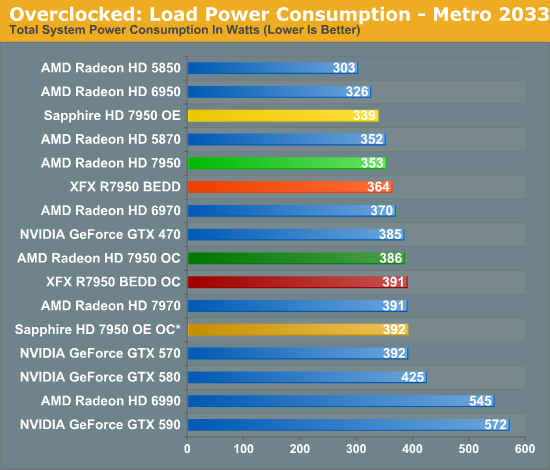
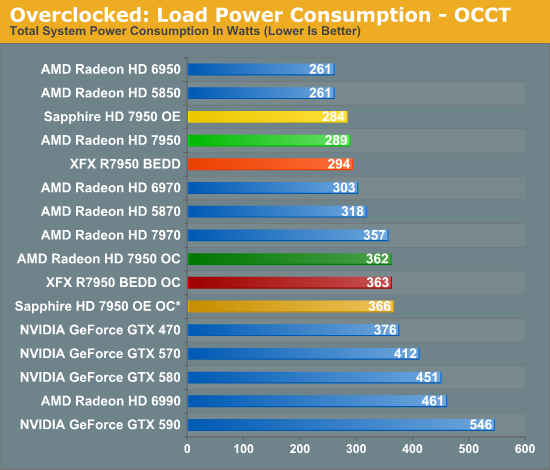
Even though we’re not increasing the voltage on our AMD and XFX cards, merely overclocking them and raising the PowerTune limit to avoid throttling does drive the power consumption up. As is typical with heavily overclocked cards, overclocking quickly drives up power consumption and the 7950s are no exception. After overclocking power consumption is almost identical to the stock 7970, so while you can get 7970 performance you still need to pay the price with 7970 power consumption. Meanwhile it’s interesting to note that even with the extra 0.1v we’ve given the Sapphire card its final power consumption is only ever so slightly higher than the other 7950s, proving that voltage is the great equalizer in this case.
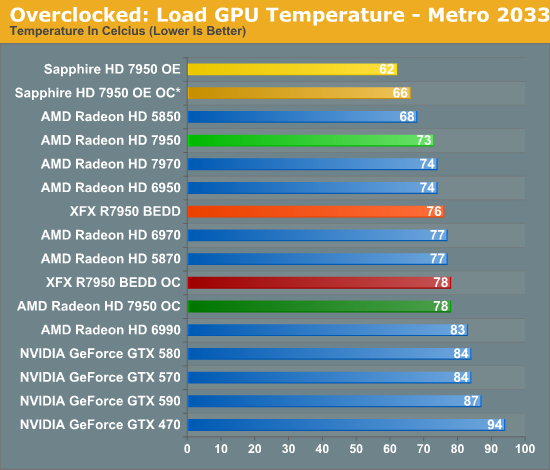
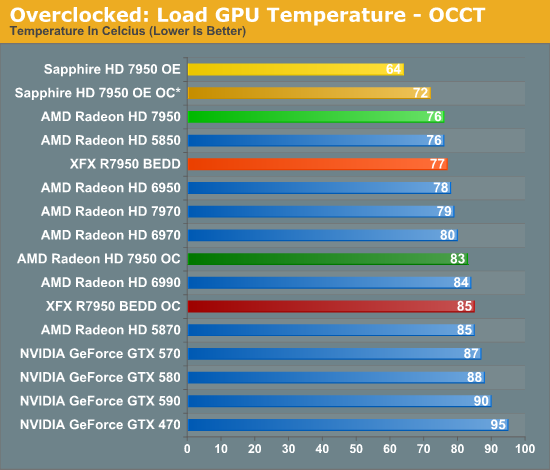
With the increase in power comes an increase in temperatures. The Sapphire card still does very well here staying in the low 70s even under OCCT, while the reference and XFX cards hit the high 70s under Metro and mid 80s under OCCT. As we’ve yet to really ascertain what the thermal limits are for Tahiti, it’s not clear whether there’s too much thermal headroom left for the GPU, particularly under OCCT.
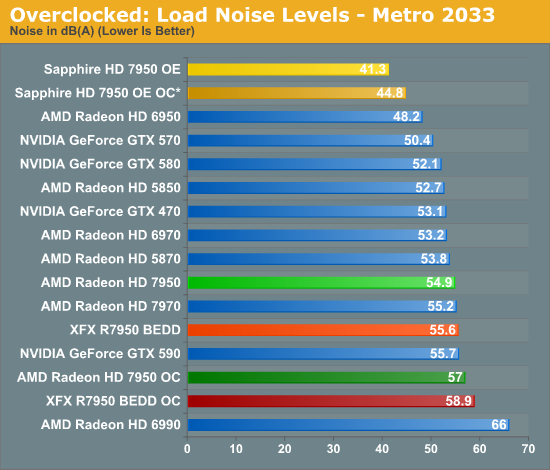
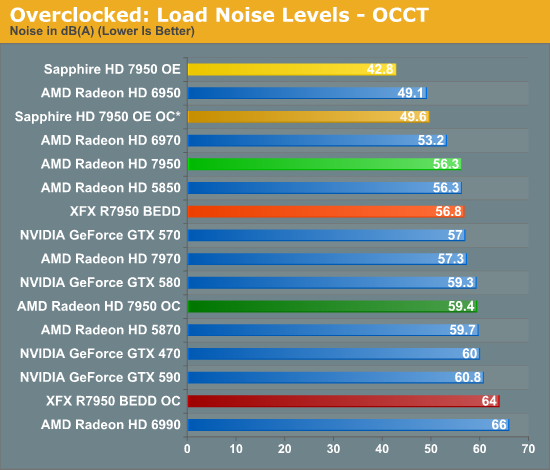
Last but not least we have load noise. The Sapphire card is once more a stellar performer, and we still can’t get it above 50dB even with OCCT. Unfortunately the XFX 7950 BEDD has its biggest fallout yet—it may be able to overclock well, but at 64dB under OCCT the performance isn’t going to be worth the immense amount of noise it creates to move enough air to keep the GPU cool.










259 Comments
View All Comments
chizow - Sunday, February 5, 2012 - link
Typical, resort to histrionics instead of facts and reasoning when arguing.Like I said, the value in the mid-range is there every single generation, not just with the 8800GT. There's a reason why AnandTech and many other sites proclaimed that launch "The Only Card that Matters" and since then any similar card that offers that same price:performance metric relative to the high end is affectionately referred to as "the next 8800GT" like the GTX 460/560 etc.
Galidou - Sunday, February 5, 2012 - link
Still you won't take any arguments that will justify paying triple the price of a card for not even double the performance, or paying more for a card that offer less performance than a last gen x2 card NEVER.That gtx280 was really mispriced and Nvidia took people for dummies by pricing it so high for the performance you gained. The most performance you saw out of those was due to the first over 1gb memory in high resolution like 2560 which applied to not even .5% of the gaming population back then
I don'T care about the titles, titles mean nothing to me that ''only card that matters'' doesn'T change the fact that paying triple the price for a video card for not even double the performance is tanking people for dummies.
Galidou - Sunday, February 5, 2012 - link
We should be happy that Ati doesn't use such pricing technique because it competes against last gen refreshed video cards and justify to pay a higher % price than the % of performance you gain.chizow - Sunday, February 5, 2012 - link
Yeah they use far worst, at least this time.They offer linear scaling of price and performance instead of offering better performance at the same prices which you would expect from a next-gen chip.
chizow - Sunday, February 5, 2012 - link
Why would I take any of your arguments when they are CLEARLY flawed.Its funny why don't you try using those arguments to justify the 7970's pricing? LMAO. Triple? Its not even DOUBLE the performance of previous mid-range cards.
Or previous x2 cards? The 7970 isn't even in the same discussion as the 6990 or GTX 590.
And of course, we've already covered how it falls completely short with regard to previous generation single-GPU flagship cards. Yet AMD somehow thinks it was worth a 10% increase in prices, something not even Nvidia has done since the 8800GTX.
What's REALLY funny though is how you seem to think the GTX 280 was priced for dummies given it actually meets the standards for next-gen GPUs and deserved its price, yet see NOTHING wrong at all with the pricing of the 7970.
Now what does that say about you and those defending it??? :(
Galidou - Sunday, February 5, 2012 - link
It's not double the performance but not double the price either still 7950 performance of gtx580 for cheaper price, convinces me enough to say it isn't taking people for dummies...chizow - Sunday, February 5, 2012 - link
Yeah once again, selective application of flawed logic.Like I said, Tahiti meets none of the established standards you'd expect from a flagship part while the GTX 280.
Yet you think the GTX 280 was priced for dummies and the 7970/7950's pricing is perfectly justified?
Honestly that just makes you look dishonest.
Or the exact type of customer AMD is looking to entice maybe! :D
Galidou - Sunday, February 5, 2012 - link
LOL I'm not even looking at changing video card but I can say bad things about ATI but you'Re definitely 1: a hardcore Nvidia fanboy or 2: they pay you to say things about standard justifying stupid prices... lol standard, what an argument, next tie I'll buy a video card, I'll try to forget a little about perfromance and look at the standard...chizow - Sunday, February 5, 2012 - link
and galidou goes off the deepend folks.Galidou - Sunday, February 5, 2012 - link
mets the standard, now chizow is our standard expert, point is I look at numbers, not standard, triple the price not double the performance, I don'T care abbout the standard when I game with it on my computer.Oh wait my game stopped playing, it tells me, this video card doesn'T meet the standard for it'S price... OMG I should of cared more....